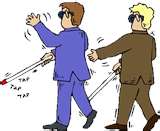Hoe blind kunnen we zijn?!
Gibran says:'Why do we pity the blind in eye and not the blind in heart??’
De Bijbel zegt:’We zien wel de splinter in het oog van de ander maar niet de balk in ons eigen oog’. We are blind to that.
We tend not to want to see our own shadow sides and to project it onto the other. Everything that annoys and irritates you in the other are aspects of yourself that you are still blind to, that you don't want to see yet.
The master spoke in general terms of the wretched condition of a disciple, without mentioning his name. When the master had finished speaking, the disciple said::"I'm so glad you're not talking about me, for the man you describe is in serious condition.”. That's how bad we see ourselves.
A codependent man who had read all my codependency brochures saw only the missing periods and commas. He was completely blind to his own codependency, that he might have come across in the brochures. I then asked him what else he noticed and then he mentioned some spelling mistakes. So he had paid attention to the mistakes and missed the gold. When you look for stones you are blind to the diamonds that come your way.
I was once at the Pastels bistro in Zutphen waiting for a friend, when i was an arrogant woman, who spoke in an affected way, with a potato in the throat, with a councilor. She bragged about her skills and wanted to be on the art committee. The alderman was clearly fed up with the woman and then the woman said:’ That Karel is such an arrogant ball, disgusting'. She didn't understand that she, when she saw Karel, looked in the mirror. She was blind to her own arrogance and had no self-reflection. She didn't understand that your surroundings are the mirror of yourself.
Most people see themselves as a human with spiritual experiences where in reality we are spiritual beings with a human experience. When you look at yourself like this you wake up and you see.
In the song Amazing Grace they sing:’Once I was blind but now I see’, don't say that about yourself too soon. Goethe gods:"If we have no notion of the whole, we do not realize how fragmentary our knowledge and perception is". It is the story of the four blind men who have to describe an elephant. The first takes a paw and says:"The elephant that's like a tree trunk", the second takes the trunk and says:’Nee, the elephant is like a big snake'. De derde pakt een oor en zegt:’Nee, the elephant is like a big leaf", the fourth finally grabs the tail and says:’De olifant is net een touw’. Ze hebben allemaal gelijk, but don't realize they only see a part. Aren't we all like those four blind people?. You are what you see.
Many people adopt an idealized self-image in order to feel 'good', that seems to help, but in reality it works against you, because you are then blind to your real self and if you already see something of your real self you can stand the by your idealized self even less.
We are blind and deaf to what the wise say. Schopenhauer said it very nicely when he said:"The wise have always said the same thing, age after age, and men have always said the same thing, age after age.", namely done the opposite '. That's tragicomic. What did the wise say then??. Love yourself and then you also love the other and know yourself. The Oracle of Delphi also said, "Know thyself". And what do we do?. We don't know ourselves and let ourselves be guided(lijden) by fear the opposite of love. Fear of falling short, afgewezen te worden, not getting any recognition, not to get love, etc. And fear attracts the dreaded, so go for it!.

